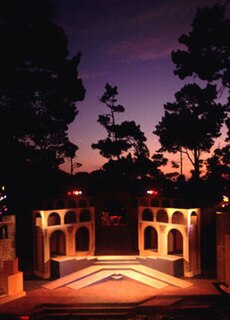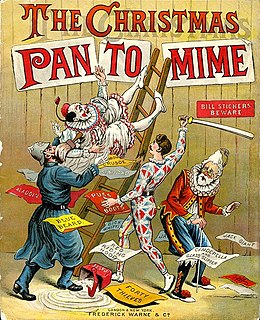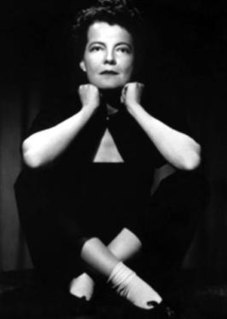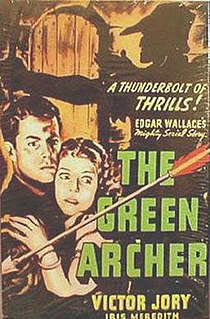
Theatre Suburbia is a non-profit community theatre company in northwest Houston, Texas. The company is the city's longest running all-volunteer playhouse, having presented a full season of performances every year since 1961.

Theatre Suburbia is a non-profit community theatre company in northwest Houston, Texas. The company is the city's longest running all-volunteer playhouse, having presented a full season of performances every year since 1961.
Theatre Suburbia was formed in the summer of 1961 and opened its inaugural season with Philip Barry's, The Philadelphia Story on October 27, 1961. Tickets for the first show sold for $1.50 and the original building at 1410 W 43rd Street would not get air conditioning until its second season. The theatre remained on 43rd Street until 2008, when the theatre moved to a modern facility at 4106 Way Out West Drive. [1] In 2020 the theatre moved to 5201 Mitchelldale Street, where it can be found today.
Theatre Suburbia produces a 7-show season of modern classics, dramas, comedies and new plays. The annual season runs from September through August. A typical season includes a mystery (often a classic Sherlock Holmes or Agatha Christie favorite), a Christmas holiday production, a play with a distinctive Texas theme or voice, a comedy, and a melodrama.
Developing a strong local theatre community is a cornerstone of Theatre Suburbia's program. An effort is made to showcase at least one play by a playwright from within the local regional community. The theatre hosts an annual script contest in which prospective playwrights can submit an original script to be considered for the summer production. Several first-time playwrights have had their scripts produced on stage at Theatre Suburbia and then gone on to have their plays published or performed at other theatres.
Theatre Suburbia's annual production of a classic melodrama [2] sets it apart from other community theatre companies. Every summer the company produces a classic melodrama.
Elements of a classic melodrama include a plot-driven story with exaggerated stereotypical characters (invariably including a virtuous victim, an unequivocally evil villain, and a larger-than-life hero). Dialog is usually exaggerated, augmented by straightforward plot devices. Melodramas, while popular in the 19th century, are seldom taken seriously by modern dramatists. [3] More often, they are lampooned (or simply left to Dudley-Do-Right cartoons).
In the hands of Theatre Suburbia's directors and actors, the melodrama takes on a very Texas style and flavor. Western frontier themes are favored in the scripts and wholesome hometown cowboys are typically the preferred hero.
Theatre Suburbia calls its melodramas "summer mellerdramas", and for more than four decades, they have proven to be the most popular productions of the year among local Houston audiences. Additional weekend matinees augment the summertime schedule to better accommodate families with young children. Before each show, the audience is provided with tips for interacting with the performers: cheer for the hero, boo the villain, and always feel free to throw handfuls of popcorn anytime the villain should venture too close to the audience.

The following outline is provided as an overview of and topical guide to theatre:

A modern melodrama is a dramatic work wherein the plot, typically sensationalized and for a strong emotional appeal, takes precedence over detailed characterization. Melodramas typically concentrate on dialogue that is often bombastic or excessively sentimental, rather than action. Characters are often drawn and may appear stereotyped. Melodramas are typically set in the private sphere of the home, focusing on morality and family issues, love, and marriage, often with challenges from an outside source, such as a "temptress", a scoundrel, or an aristocratic villain. A melodrama on stage, filmed, or on television is usually accompanied by dramatic and suggestive music that offers cues to the audience of the drama being presented.

The Oregon Shakespeare Festival (OSF) is a regional repertory theatre in Ashland, Oregon, United States, founded in 1935 by Angus L. Bowmer. From late February through October each year, the Festival now offers 800 to 850 matinee and evening performances of a wide range of classic and contemporary plays not limited to Shakespeare to a total annual audience of nearly 400,000. The Festival welcomed its millionth visitor in 1971, its 10-millionth in 2001, and its 20-millionth visitor in 2015. At any given time between five and eleven plays are offered in daily rotation six days a week in its three theatres.

The Classical Theatre of Harlem (CTH) is an off-broadway professional theatre company founded in 1999 at the Harlem School for the Arts. Producing on average 2-3 productions a year as well as implementing extensive educational programming, CTH remains the only year round theatre company operating on an AEA LORT contract in Harlem. Its season selections present a world repertory ranging from Euripides to Derek Walcott, featuring classical and new emerging playwrights. Since its founding, the CTH has put on over 40+ productions, which have received numerous AUDELCO, OBIE, Drama Desk, American Theatre Wing and Lucille Lortel nominations and awards.

Pantomime is a type of musical comedy stage production designed for family entertainment. It was developed in England and is performed throughout the United Kingdom, Ireland and in other English-speaking countries, especially during the Christmas and New Year season. Modern pantomime includes songs, gags, slapstick comedy and dancing. It employs gender-crossing actors and combines topical humour with a story more or less based on a well-known fairy tale, fable or folk tale. Pantomime is a participatory form of theatre, in which the audience is encouraged and expected to sing along with certain parts of the music and shout out phrases to the performers.

Prairie Theatre Exchange (PTE) is a professional theatre in Winnipeg, Manitoba, Canada. It is located on the third floor of Portage Place mall in downtown Winnipeg. By the end of the 2016-17 season, PTE had presented 340 plays on its thrust stage over its 44 year history, 149 of which were world premieres, to an annual average attendance of 35,000 people.
Houston is a multicultural city with a thriving international community supported by the third largest concentration of consular offices in the United States, representing 86 nations. In addition to historical Southeast Texas culture, Houston became the fourth-most populous city in the United States. Officially, Houston is nicknamed the "Space City" as it is home to NASA's Lyndon B. Johnson Space Center, where Mission Control Center is located. "Houston" was the first word spoken on the moon. Many locals refer to Houston as "Bayou City." Other nicknames include "H-Town", "Clutch City", and "Magnolia City".

Margo Jones, nicknamed "The Texas Tornado," was an American stage director and producer best known for launching the American regional theater movement and for introducing the theater-in-the-round concept in Dallas, Texas. In 1947, she established the first regional professional company when she opened Theatre '47 in Dallas. Of the 85 plays Jones staged during her Dallas career, 57 were new, and one-third of those new plays had a continued life on stage, television and radio. Jones played an important role in the early careers of a range of playwrights such as Tennessee Williams, William Inge, Joseph Hayes, Jerome Lawrence, and Robert E. Lee.

South Coast Repertory (SCR) is a professional theatre company located in Costa Mesa, California.

Stages (Houston) is a theatre company in the city of Houston, Texas formerly known as Stages Repertory Theatre. It produces performances at The Gordy, the company's three-stage venue that opened in 2020 in Houston's Montrose neighborhood. The Houston Chronicle calls it "the equivalent of off-Broadway in Houston".
Main Street Theater is a theatre company in the city of Houston, Texas. It consistently produces a repertoire of classic and contemporary plays, and its seasons generally run throughout the entire year.

The Ensemble Theatre, located in the heart of midtown at 3535 Main Street in Houston, Texas, is the largest African-American professional theatre company in the United States that produces plays in-house and owns its own facility.
As the new medium of cinema was beginning to replace theatre as a source of large-scale spectacle, the Little Theatre Movement developed in the United States around 1912. The Little Theatre Movement served to provide experimental centers for the dramatic arts, free from the standard production mechanisms used in prominent commercial theatres. In several large cities, beginning with Chicago, Boston, Seattle, and Detroit, companies formed to produce more intimate, non-commercial, non-profit-centered, and reform-minded entertainments.

The Green Archer is the 12th serial released by Columbia Pictures. It was based on Edgar Wallace's 1923 novel The Green Archer, which had previously been adapted into the silent serial of the same name in 1925 by Pathé Exchange.

Minnesota Centennial Showboat was a traditional riverboat theatre docked at Harriet Island Regional Park on the banks of the Mississippi River in downtown Saint Paul, Minnesota, United States. The showboat contained an intimate jewelbox theatre that seated 225. The interior was decorated to keep in time with the Victorian Era style commonly associated with showboats. The Minnesota Centennial Showboat was run through a partnership with the University of Minnesota Theatre Department and the Padelford Boat Company. The showboat was a longtime tradition with the University beginning in 1958. The University Theatre utilized the showboat as a learning opportunity for its students to experience professional theatre. The showboat had its final performance in 2016.

Drama is the specific mode of fiction represented in performance: a play, opera, mime, ballet, etc., performed in a theatre, or on radio or television. Considered as a genre of poetry in general, the dramatic mode has been contrasted with the epic and the lyrical modes ever since Aristotle's Poetics —the earliest work of dramatic theory.

Theater in Pittsburgh has existed professionally since the early 1800s and has continued to expand, having emerged as an important cultural force in the city over the past several decades.
The School of Theatre and Dance is a department within the Kathrine G. McGovern College of the Arts at the University of Houston. The School offers both Bachelor of Fine Arts and Master of Fine Arts programs, including a Bachelor of Fine Arts in acting, stage management, technical theatre, theatre education and a joint degree in both playwrighting and dramaturgy; all at the undergraduate level. Graduate programs are offered in: acting, theatre studies, theatrical design, technical direction, and theatre education. The current Director of the School of Theatre and Dance is Rob Shimko, a position he has held since 2016.

The Yucca Theater is a theatre in Midland, Texas. In 1927, oilman and former Montana senator Thomas S. Hogan announced plans to build a theatre to complement the nearby Petroleum Building. Opened in 1929, the Yucca Theatre started as a movie and vaudeville house. The theatre is a Texas historic landmark. The Summer Mummers is a yearly production presented at the Yucca, and runs on Friday and Saturday nights from the first weekend in June to Labor Day weekend. There are typically 30 performances each summer. The show comprises a locally written melodrama, followed by the olio.
"The Mystery of a Hansom Cab" is a 1961 Australian television drama play based on Barry Pree's 1961 play adaptation of the novel by Fergus Hume. It appeared as an episode of the anthology series The General Motors Hour.